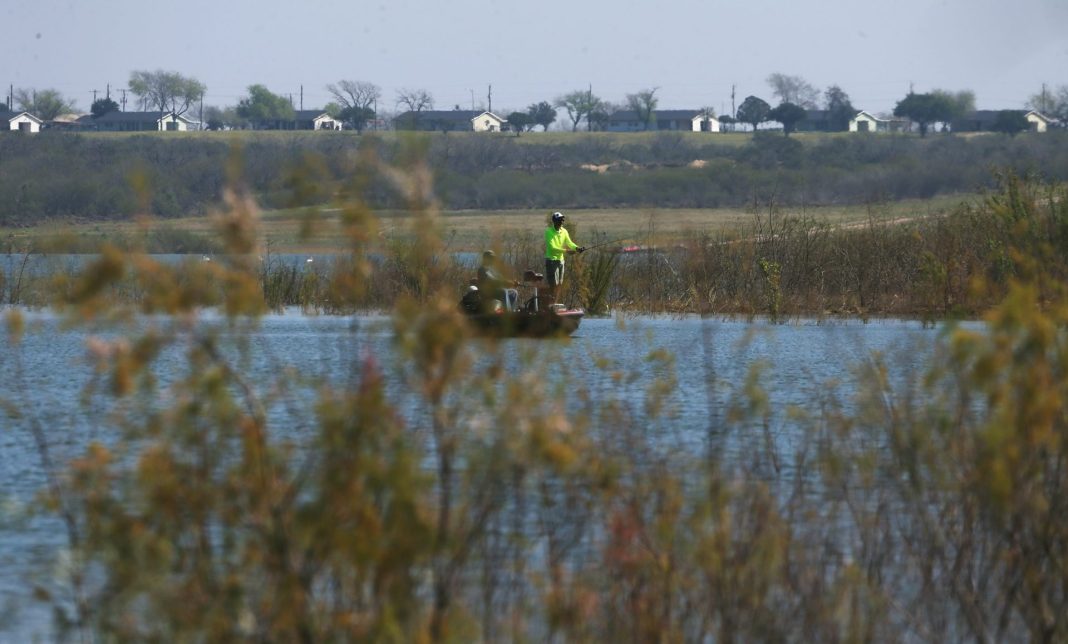|
Only have a minute? Listen instead
Getting your Trinity Audio player ready...
|
A bipartisan, bicameral delegation of Texas lawmakers are urging Congress to withhold millions in funding from Mexico until that country makes good on its water debt to the United States.

The effort is being led by Republican Sens. John Cornyn and Ted Cruz, and has been joined by the Rio Grande Valley’s delegation of House representatives, including U.S. Reps. Monica De La Cruz, R-McAllen, Vicente Gonzalez, D-Brownsville, and Henry Cuellar, D-Laredo.
Together, the group on Monday sent a letter to the leaders of the House and Senate Appropriations Subcommittees on State and Foreign Operations urging them to withhold funding from Mexico in Congress’ 2025 appropriations bills.
“Despite ongoing diplomatic efforts, Mexico still fails to provide minimum, consistent water deliveries to the United States from the Rio Grande, instead waiting until the end of a five-year cycle to deliver the water owed to America,” the lawmakers’ letter reads, in part.
“While the United States provides consistent, annual water deliveries to Mexico (from the Colorado River watershed), the Mexican practice poses a serious threat to the agricultural, industrial, and municipal sectors in border states,” they further stated.
In a statement to The Monitor on Monday, Gonzalez said about $7.6 million in FY 2025 funding is at stake.
Up to 15% of funding from the State, Foreign Operations, and Related Programs, or SFOPs, appropriations, would be withheld from Mexico, though it remains unclear which sectors of Mexico or its government would be affected.
“This funding would be diverted from a variety of different programs and this language does not state exactly which funds need to be divested,” Gonzalez said.
The proposal to withhold funding represents an escalation of tensions not only between American lawmakers and Mexico, but the U.S.’s own diplomatic efforts.
In recent months, the Texas delegation has repeatedly reached out to Secretary of State Antony Blinken, sponsored congressional resolutions and more.

“I have been disappointed in the secretary and the fact that he has not given it the attention that it deserves,” De La Cruz said.
Mexico is obligated, under the terms of a 1944 water sharing treaty, to deliver some 1.75 million acre feet of water to the United States every five years from the six Mexican tributaries that feed the Rio Grande.
The water that flows downstream from the Mexican Chihuahuan mountains is vital to the millions of residents who live along both sides of the river’s border communities.
Ideally, Mexico would deliver that water in roughly equal increments of 350,000 acre feet per year; however, over the past three decades, Mexico has consistently pushed the limit on fulfilling its treaty obligations.
Mexico nearly defaulted in the previous five-year cycle, which ended in October 2020 and would have marked the third consecutive cycle to have ended in a deficit.
To avoid that, Mexico transferred ownership of some of its share of water stored at Falcon and Amistad into the United States’ possession.
It was a move that took water away from its own border states, while supplying the U.S. water without actually adding physical volume to the reservoirs.
But, it allowed Mexico to finish the 2015-2020 cycle in compliance with the treaty.
Four years into the current cycle, and Mexico is again woefully behind on making water deliveries.
According to data provided by the International Boundary and Water Commission, which is responsible for overseeing the binational treaty, Mexico has delivered under 400,000 acre feet of water between Oct. 25, 2020 and May 4 of this year.

That’s slightly more than one year’s worth of water.
IBWC officials and local water experts say that Mexico no longer has enough water stored within its own reservoirs to meet the deficit.
Indeed, the Commission’s data show that Mexico’s largest reservoirs — La Boquilla and El Cuchillo — have fallen well below 40% conservation capacity.
Lying along the Rio Conchos, La Boquilla is the single largest contributor to the Rio Grande’s inflows, but currently, it sits at just 28% conservation capacity, according to the IBWC data.
As recently as 2022, Mexico had substantial water after a tropical weather system that summer dumped enough rain to fill its reservoirs to overflowing.
But even during that time of abundance, Mexico failed to release water to the U.S.
Valley farmers have long alleged that that illustrates Mexico’s standard operating procedure — to delay deliveries until the situation becomes critical.
Earlier this year, the situation became not just critical, but fatal, for the Valley’s sugar industry, which was forced to permanently cease operations.
“Despite being significantly behind on their water delivery obligations to the U.S., how much of that 2.6 million acre-feet did Mexico use to reduce its delivery deficit to the U.S. and the water users of South Texas? The answer is zero,” Tudor Uhlhorn, a Valley sugarcane farmer, said in early March.

Uhlhorn and other farmers have long urged Valley leaders to do what they can to increase the pressure on Mexico.
Their pleas are being heard.
With Monday’s announcement, the Valley’s highest elected officials are hoping to send Mexico a message.
“This is a … statement to Mexico that we are going to do everything within our power as congressmen to put all the pressure possible on Mexico,” De La Cruz said.
In fiscal year 2023, the U.S. gave Mexico nearly $149 million in aid, including $77 million earmarked for “governance” — which includes law enforcement funding, according to an aid tracker on the Office of Foreign Assistance’s website.
In 2022, the United States gave Mexico more than $231 million in aid, making it the sixth ranked foreign country to receive American aid dollars.
The $7.6 million in SFOPs funding the Texas lawmakers propose to withhold represents just a small drop in the bucket of aid the U.S. provides. But for De La Cruz, every dollar withheld matters.
“I believe that any amount that is withheld from Mexico is sending a loud statement that we mean business,” the congresswoman said.
Gonzalez agreed, saying the time for talk is over.
“We do need to find further ways to make this more painful for Mexico. Empty resolutions and press conferences lead to no solutions,” Gonzalez said.
To that end, the freshman congresswoman from McAllen is already thinking about next steps.
“We’re looking at putting language in the farm bill pertaining to water,” De La Cruz said.
“We’re working with ag committee and seeing if that is yet another avenue that we can take in order to, once again, pressure, Mexico and pressure (USDA Secretary Tom Vilsack) to put focus on this water issue,” she said.
Several other Texas lawmakers, including Reps. Tony Gonzalez, R-San Antonio, Nathaniel Moran, R-Tyler, Ronny Jackson, R-Amarillo, Jodey C. Arrington, R-Lubbock, and Keith Self, R-McKinney have also cosigned the effort to block the Mexico funding.




